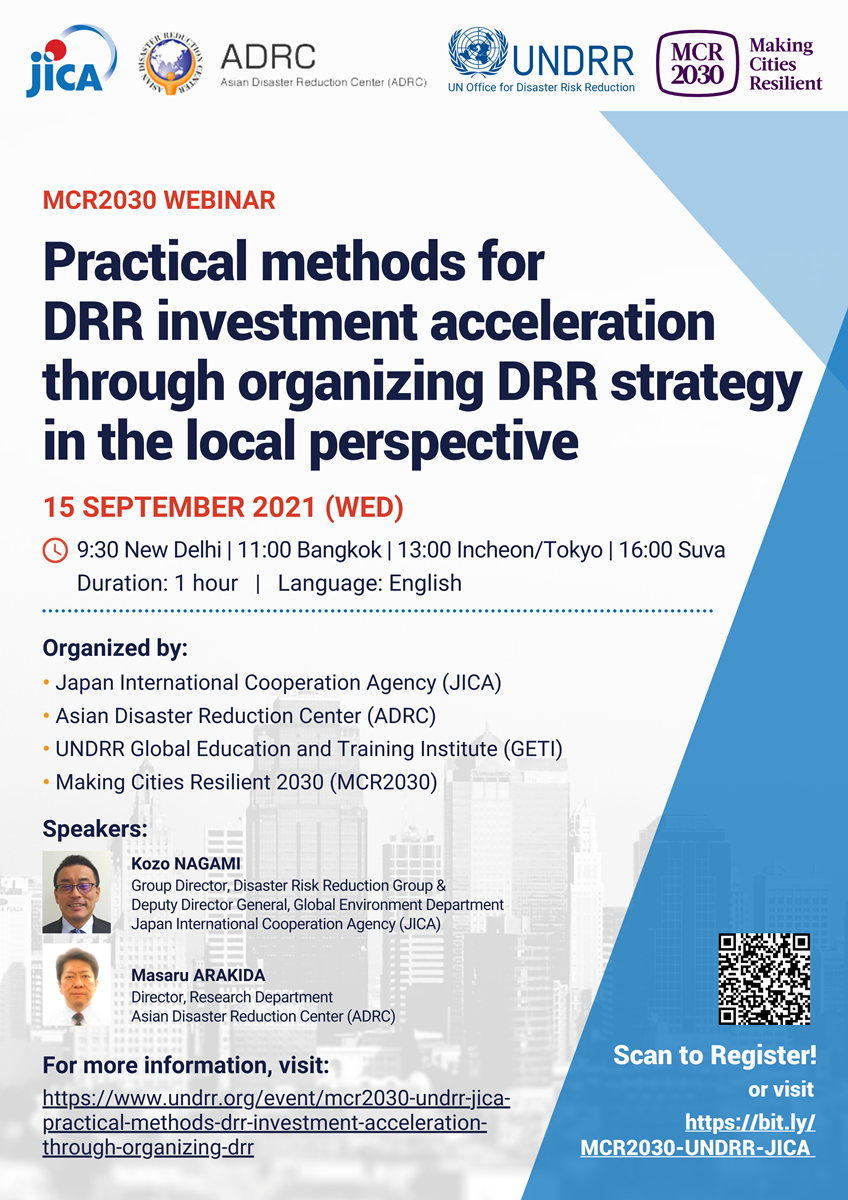[MCR2030-UNDRR-JICA] Practical methods for DRR investment acceleration through organizing DRR strategy in the local perspective

- English

Event Description
Disaster risk reduction (DRR) strategies can help guide cities towards sound actions to improve disaster resilience. As a Core Member of the Making Cities Resilient 2030 (MCR2030), the Japan International Cooperation Agency (JICA) provides an 8-step practical method for developing local DRR strategies and plan which helps cities accelerate pre-disaster investments. This webinar will provide an insight to this 8-step approach together with case examples of pre-disaster investment projects by cities. This guidance is available to all MCR2030 participating cities.
Speakers
- Dr. Kozo NAGAMI, Group Director for Disaster Risk Reduction Group and Deputy Director General, Global Environment Department, Japan International Cooperation Agency (JICA)
- Mr. Masaru ARAKIDA, Director, Research Department, Asian Disaster Reduction Center (ADRC)
Date & Time
Date: 15 September 2021 (Wed)
Time: 9:30 New Delhi | 11:00 Bangkok | 13:00 Incheon/Tokyo | 16:00 Suva
Duration: 1 hour
Language: English
Organizers
- Japan International Cooperation Agency (JICA)
- Asian Disaster Reduction Center (ADRC)
- UNDRR Global Education and Training Institute (GETI)
- Making Cities Resilient 2030 (MCR2030)
About Japan International Cooperation Agency (JICA)
Established as an Incorporated Administrative Agency under the Act of the Incorporated Administrative Agency, the Japan International Cooperation Agency (JICA) aims to contribute to the promotion of international cooperation as well as the sound development of Japanese and global economy by supporting the socioeconomic development, recovery or economic stability of developing regions. JICA aims for a society where all people can protect themselves from various threats and live their daily lives in security and with dignity (human security) and promotes sustainable growth with less disparity and without harming the environment (quality growth). JICA dispatches experts and overseas volunteers to developing countries, and in return welcomes government officials and specialists as training participants and overseas students. People-to-people connections established through human resource development are the foundations of trust between developing countries and Japan. JICA uses an array of development assistance schemes to meet the diverse needs of developing countries around the world, including, for example, technical cooperation, finance and investment cooperation (ODA loans) and grants.
About Asian Disaster Reduction Center (ADRC)
The Asian Disaster Reduction Center (ADRC) was established in Kobe, Hyogo prefecture, in 1998 with the mission of enhancing the disaster resilience of its member countries, building safe communities, and creating a society where sustainable development is attainable. ADRC works to build disaster-resilient communities and to establish networks among countries through personnel exchanges and a variety of other programs. ADRC addresses the issue of disaster risk reduction from a global perspective in cooperation with a variety of United Nations (UN) agencies and international organizations, such as the UN Office for Disaster Risk Reduction (UNDRR), the UN Office for the Coordination of Humanitarian Affairs (UNOCHA) the UN Economic and Social Commission for Asia and Pacific (UNESCAP), the Asia-Pacific Economic Cooperation (APEC) and the Association of South-East Asian Nations (ASEAN)
About the UNDRR Global Education and Training Institute (UNDRR GETI)
UNDRR GETI was established in 2010 to develop a new cadre of professionals in disaster risk reduction and climate change adaptation to build disaster resilient societies. GETI has a global mandate to provide capacity building support to mainstream disaster risk reduction and climate change adaptation into sustainable development; convene and support inter-city learning to strengthen resilience (Making Cities Resilient); and to provide capacity building and best practice sharing support to national training institutions working on resilience issues. Based in Incheon, the Republic of Korea, UNDRR GETI is also the global secretariat of the Making Cities Resilient 2030 (MCR2030).
About the Making Cities Resilient 2030 (MCR2030)
Making Cities Resilient 2030 (MCR2030) is a unique cross-stakeholder initiative for improving local resilience through advocacy, sharing knowledge and experiences, establishing mutually reinforcing city-to-city learning networks, injecting technical expertise, connecting multiple layers of government and building partnerships. Through delivering a clear 3-stage roadmap to urban resilience, providing tools, access to knowledge and monitoring and reporting tools, MCR2030 will support cities on their journey to reduce risk and build resilience.
MCR2030 aims to ensure cities become inclusive, safe, resilient and sustainable by 2030, contributing directly to the achievement of Sustainable Development Goal 11 (SDG11) “Make cities and human settlements inclusive, safe, resilient and sustainable”, and other global frameworks including the Sendai Framework for Disaster Risk Reduction, the Paris Agreement and the New Urban Agenda.
For more information:
- MCR2030 Global Secretariat at [email protected]